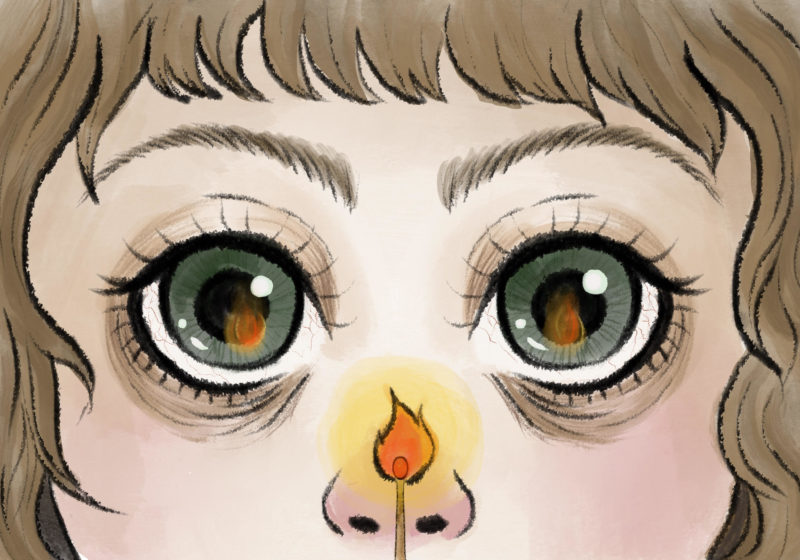As I write this, I find myself staring at the dirty clothes flowing out my laundry hamper, the floor I have yet to clean, and the garbage I have not thrown away. I have assignments to finish and people back home to call and jobs to apply for and clubs to join… and all these things still seem out of reach.
My metaphorical fingers brush against the words of my mental to-do list, and yet I can’t bring myself to actually check anything off.
Burnout is cruel in that way. The physical and mental exhaustion doesn’t erase the guilt we feel from our inability to do anything. Some of you reading this know what I’m talking about. Some of you reading this have had your inner flame reduced to nothing but ashes.
But for those of you who can’t conjure up any memories when you hear those two words, I’ll try to explain it.
The first time I ever experienced burnout was during my second semester of my junior year of high school. The entire year was terrible, and I often found myself on the brink of exhaustion, waiting for it all to be over. My motivation to do anything had dwindled to nothingness, and I felt empty. Working through any assignment was agonizing. Canceling my extracurriculars became a habit. Calling or texting friends back took days sometimes.
Burnout, for me, felt like drowning in the deep end of a pool. I’m choking on water. My lungs and legs are burning. I’m too tired to even panic. I keep kicking and kicking and kicking, but I can’t seem to break the surface.
The kicks are getting slower and slower, and I feel myself sinking.
That was my burnout.
But if that doesn’t make sense, I’ll use the words of Reddit user kakemannen: “I feel like I’m on the last stretch on Tetris, I’m shuffling bricks side to side, with no hope of change or victory, desperate not to fail with this block, but I know that whatever I’ll do, I’m still damned. The bricks keep on coming, and the speed only increases.”
And if that still doesn’t make sense, this is Google’s definition: “burnout: to ruin one’s health or become completely exhausted through overwork.”
The only upside the pandemic had for me was allowing me to take some much needed time to recharge my batteries. Being at home with my family and having a more relaxed workload for the last semester of junior year gave me the kick I needed to finish high school strong.
By the time senior year rolled around, I finally broke the surface.
Unfortunately, starting college after a remote-learning senior year has me feeling the remnants of burnout once again.
I have to kick a bit harder to keep my head above water, and I’m sure for many of you it’s the same.
Being back just feels weird. I feel like I’m still relearning how to be a good student: how to study, when to go to bed, when to wake up, how much effort to put into homework, how to time manage, how many clubs to join, what to do, what not to do. It’s exhausting.
For many of us, remote learning allowed us to try less while still doing well. We could roll out of bed and go to class, cheat on tests, not pay attention, abandon jobs and other extracurriculars, and no one was there to say anything about it. The world had bigger problems.
But now that the world is slowly trying to get itself back on track that means we have to, too. So for those of you out there struggling and on the brink of burn out I have some, hopefully, helpful advice.
- Be kind to yourself: Please don’t beat yourself for struggling. We’ve all been there.
- Don’t take on too much: Try not to overwhelm and overexert yourself. You’ll only hurt
yourself more by doing too much. - Create small goals: If you feel like you’re struggling to do the big tasks, break them up
into smaller ones that are more manageable. - Sleep and eat well: Sleeping and eating well will do wonders for your motivation by
giving you the energy you need to survive each day. - Find hobbies: Having something stress-relieving to do in your spare time will prevent
you from overthinking. - Hang out with friends: Spend time with your friends and share your problems with them. It’s always good to have people you trust to listen to.
- Take time off: Remember to dedicate time each day to just rest and relaxation, so you don’t stress too much.
- Utilize UCC: Please use your free UCC sessions! It’s always good to get in contact with a professional for any issues you’re struggling to handle on your own or just any issue at all.
Hope these tips are helpful! I wish you all luck this year! Be kind to yourselves and each other!






